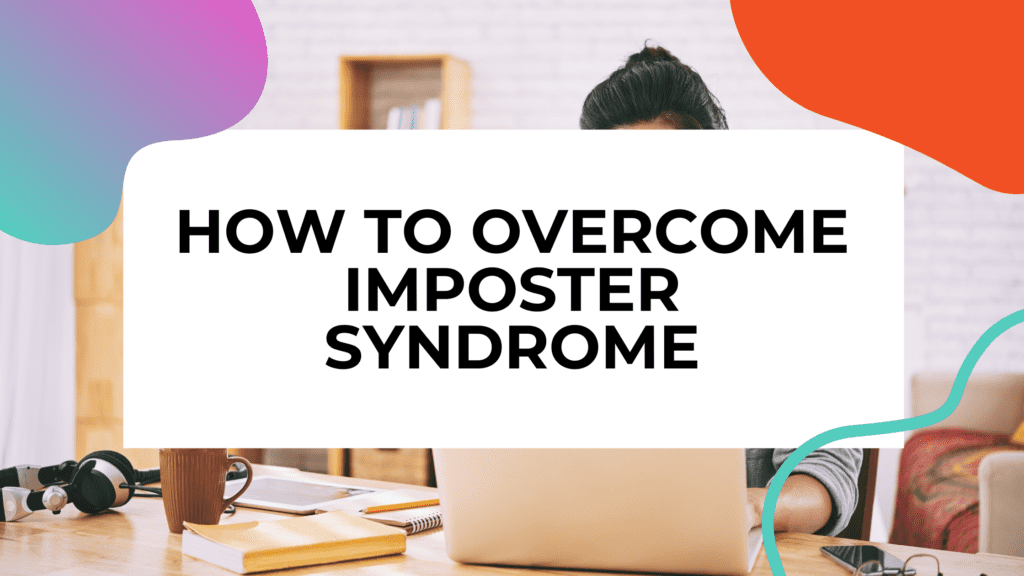Our website is supported by our users and contains affiliate links. We get paid when you purchase or sign up for anything through those links. Read the full disclaimer for more information.
Last Updated on July 22, 2022 by Daniella
Have you ever sat in front of a task that you knew you had to complete, but you felt that deep gut wrenching feeling that you’re are somehow not good enough to accomplish it?
You’re not alone. Many of us have struggled with how to overcome imposter syndrome. According to Inc, 80% of adults have reported experiencing imposter syndrome at some point in their lives. It more commonly affects women, non-binary, and people of color.
In an anxiety driven capitalist society divided along fault lines like gender, class, and race, it’s no wonder we feel like imposters. All our society has ever told us is that we aren’t good enough.
But you know what – we are good enough and more than we ever imagined.
Working to shift your mindset can be crucial to understanding why you’re thinking the way you’re thinking and also allow you to move through imposter syndrome and speak from a place of confidence.
You can slay that task like the queen you are and you know why!? Because you are not this shrunken down version of yourself like how you perceive yourself during a daunting task or situation.
Your power is unlimited.
Table of Contents
Let’s Talk About The History of “Imposter Syndrome”
Before we can talk about ways to overcome imposter syndrome, we need to talk about how this “syndrome” has been used to negatively impact the careers of women, and specifically women of color and other marginalized groups.
The Harvard Review does a more complete analysis, and you can read that here. But I wanted to make a valiant effort to point out what is, and isn’t, imposter syndrome, from a historical perspective.
Marginalized communities often find themselves at odds with work culture. We’re not seen as team players, or we’re too loud, or we’re lacking in leadership qualities. None of those things is inherently true; instead they’re a product of work culture, misogyny, racism, transphobic, and homophobic behaviors rampant in late stage American Capitalism.
Most people feel some sort of doubt when they first start in their career. These feelings typically dissipate by the time they’re mid level in their career. However, what is often seen as imposter syndrome is actually a societal affront to marginalized communities. They’re unable to shake these feelings of doubt, not because their work is not of quality, but because they’ve been consistently thrown microaggressions during their career.
If you’re a woman, nonbinary, transgender, or a person of color, or someone in the queer community, you might not be feeling imposter syndrome. You might actually be feeling the weight of society transpiring against you to keep you in your place in the workforce. It’s subtle, and unable to be called out well, but it happens frequently. And it’s the reason why many in marginalized communities leave full time employment to become entrepreneurs.
If you’re struggling, imposter syndrome might not be the root cause.
How to Overcome Imposter Syndrome : 7 Ways
Imposter syndrome is a bear to struggle with, but it’s overcomeable. These reasons will help you combat it and give yourself intentional practices to keep at the forefront of your mind.
1. Practice makes near perfect.
Practice is the number one gift you can give yourself to overcome imposter syndrome.
One of the reasons we get imposter syndrome is because we’re new and lack confidence with our skill. When it comes to building a successful side hustle, you’re going to feel new at first. Don’t let that stop you from trying and continuing to explore it anyway you want.
Even if you’re not working with clients, practicing your skill can give you confidence and help fight imposter syndrome.
Related: How to Find Free Online Courses to Boost Your Skills
2. Write down a list of your qualifications.
Another reason that imposter syndrome creeps up is that we have a limiting belief that we aren’t good enough. Instead of listening to that, when that small voice comes to wreck your progress, write down a list of reasons why you’re good enough – because you are in fact, good enough!
This can come in a variety of different forms.
- Keep compliments from clients on your desk to show yourself you’ve done good work
- Write down any qualifications you have to show yourself how much you already care about your craft
- Keep awards you’ve won present to remind yourself that others believe in you
If you don’t have some of these, that’s okay. They will come in time. Instead, write a list of reasons why you’re good at what you do. It could be that you’re passionate about it, curious about it, or that your friends have always said you’re great at it.
Whatever positive motivator to keep you grounded you need is important. Keep it present and accessible when you work.
3. Tell yourself why you’re the best person for this job.
Oftentime imposter syndrome creeps up because we don’t believe in our ability to do the job. Fight that by going to the root of the problem.
Ask yourself why you’re good for this job. Maybe because you’re a kick ass graphic designer and are passionate about the product. Maybe because you’re an amazing writer who cares about personal finance.
Find your why and hold onto it. Tightly.
Your why is your key to doing what you do. It can be scary to start something new, or feel like you’re not good enough, but if you keep your why at the forefront of your mind, you’ll be able to remember why you’re doing this and keep going.
4. Set a timer for 30 minutes and work.
Oftentimes imposter syndrome can keep us from working on the project at all. Short circuit this by giving yourself a 30 minute timer and just starting. Don’t allow yourself to judge the work you’re doing, just get started on the project.
Sometimes not giving imposter syndrome time to overwhelm you and jumping into the project is the jumpstart you need to fight it.
5. Address your thinking traps, and flip the script.
Imposter syndrome comes from doomsday thinking. Often we hear scripts in our head like “I’m going to be terrible at this and there’s no way they’re going to hire me.” The flipped script to that is, “Well what if it turns out okay, and they do hire me again.” Encouraging yourself to think positively is a huge way to shift your mindset and think positively.
Another common thinking trap is, “I’m not qualified to do this and they’re not going to be pleased with the product.” You can flip this around as well and say, “It’s okay that I’m new at this. I’m only going to get better with experience and I shouldn’t be too hard on myself.”
6. Develop a support group of creatives doing the same thing.
Having a group of people who are fully committed to their craft can be super helpful when fighting imposter syndrome. Hearing other people tell you that you’re doing well and listening when you’re fighting your inner demons is hugely important to combating imposter syndrome.
You’ll also be able to give back to your community and help other people with their imposter syndrome. This helps you see that you believe in people the same way they believe in you and it can help rewrite how you feel about your craft.
If you’re looking for a community to connect with others, check out our free side hustler community.
7. Ask for help.
Imposter syndrome can get overwhelming if you let it fester alone. Asking for help can manifest in a variety of different ways.
Sometimes, you just need clarification on a project. While it can feel scary to ask your client for more details on a project, this is the best way to get the project done correctly and to your client’s satisfaction. If you need to, practice what you’re going to say before reaching out to the client. Or, send an email.
Other times, asking for help can be reaching out to another freelancer in your network and sharing the project. If you’ve realized that the scope of your project is too large to handle alone, it’s okay to bring another person on. Just make sure they’re paid adequately for their help.
Remember: You Are Not An Imposter
Imposter syndrome is one of the roughest crosses to bear in the freelance world. It takes every trick in the box to help get you to a place where you can finally banish your imposter syndrome. And it’s okay if that takes awhile.
The important thing is that you refuse to let it overwhelm your creativity.
What are some ways you’ve battled imposter syndrome and won?
Related:
- How to Recover From Burnout: 5 Steps I’ve Taken
- What Is Financial Therapy?
- Sidepreneur: My Side Hustle Journey
Pin it for later!


Moriah Chace writes about low-income money and queer culture. Her work has been featured by The Motley Fool and other large media outlets. She has words in Women’s Personal Finance, The Deal Taker, and Live Betr. As a part-time barista and full-time coffee addict, she spends her spare time over-caffeinated fixing up her 1978 Winnebago Itasca and plans to travel around the USA with her dog and two cats after she breathes life into the old soul of an RV.

